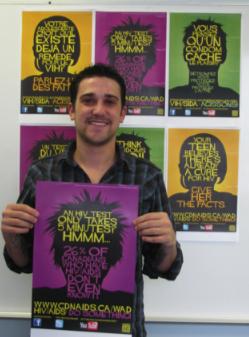Jordan Tarini, like so many other young people, moved to Ottawa after high school to reinvent himself.
He has something else in common with a growing number of youth in both Ottawa and across Canada: he is HIV-positive.
Tarini, 25, moved from Sudbury to study at Carleton University in 2003. He came out during his first year of university and began adult life as an openly gay man. He worked at gay bars like Edge and took in as much as he could of gay life in the big city.
“I know there are other people out there like me who maybe lived in a rural area and weren’t able to be as open and moved to a bigger city and kind of went crazy,” says Tarini, who was diagnosed with HIV in 2006.
“It was a shock at first, but I knew I couldn’t let it take over my life. I was only 20; I knew that I had my whole life ahead of me,” he says. “I had to do what I could to help people in the same situation, those who didn’t know what it was, didn’t realize how rampant it was in Ottawa and how it has been growing in the bigger cities.”
While he says he knew little about HIV before moving away from Sudbury, Tarini now acts as the youth director for the Canadian AIDS Society (CAS), helping to educate young people about HIV/AIDS.
“There’s been less education and more infections,” he says.
The CAS, a national coalition of more than 120 community-based AIDS organizations across the country, reports that there are 3,070 new infections in Canada every year.
To commemorate the 25th anniversary of the CAS and the 30th anniversary of the first reported case of HIV, the organization is reaching out to younger Canadians through a new campaign.
Dubbed the Do Something campaign, it encourages youth across Canada to use social media to raise awareness and educate others about HIV.
“This is the first campaign of its kind for the CAS. It’s specifically designed by youth for youth,” says Monique Doolittle-Romas, executive director of the CAS.
The CAS created an advisory committee of young Canadians between the ages of 15 and 29. Some were HIV-positive, including Tarini.
World AIDS Day, Dec 1, is usually marked with events like vigils, Tarini says. This year, the CAS launched Do Something as a month-long event.
The campaign includes information on Facebook and Twitter so people can share their personal accounts. There is also a YouTube competition for young people who want to create videos about their thoughts on HIV.
Doolittle-Romas says she hopes the campaign will help young people learn about HIV and how it is transmitted.
The campaign presents a series of 25 actions people can take as opportunities to talk about HIV/AIDS, including volunteering at HIV-focused organizations or donating blood.
“There are 68,000 Canadians who have HIV/AIDS,” says Doolittle-Romas. “It could be your friend, your neighbour. It’s in my community, your community, in all of our communities.”
Tarini says it’s important to remember and honour the “pioneers of the movement.”
“There was an out-of-control virus in the ’80s and it was the pioneers, the people who were living with it, who people were scared of, but they still went out and did something,” Tarini says. “For them, we should be showing that we will continue to carry this torch.”
As head of the AIDS movement in Canada, Tarini says the CAS has a great platform to educate Canadians about HIV.
Educational and preventative measures are especially important considering the financial costs of living with the disease.
The CAS reports that each new diagnosis costs Canadians $1.3 million.
While the CAS is always in need of donations, Tarini says awareness and education are more important.
“Youth feel invincible a lot of the time, but they need to know they can get this,” he says. “We will have friends with it or we do already, and it’s about recognizing that the numbers are high, especially in Ottawa.”


 Why you can trust Xtra
Why you can trust Xtra


